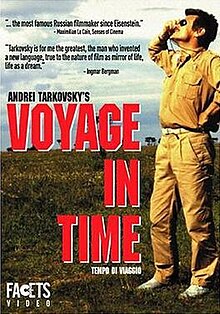
Andrei Arsenyevich Tarkovsky was a Soviet film director and screenwriter. He has been widely considered one of the greatest directors in cinema history. His films explore spiritual and metaphysical themes and are known for their slow pacing and long takes, dreamlike visual imagery and preoccupation with nature and memory.

Stalker is a 1979 Soviet science fiction film directed by Andrei Tarkovsky with a screenplay written by Arkady and Boris Strugatsky, loosely based on their 1972 novel Roadside Picnic. The film tells the story of an expedition led by a figure known as the "Stalker", who guides his two clients—a melancholic writer and a professor —through a hazardous wasteland to a mysterious restricted site known simply as the "Zone", where there supposedly exists a room which grants a person's innermost desires. The film combines elements of science fiction and fantasy with dramatic philosophical, and psychological themes.

The Sacrifice is a 1986 drama film written and directed by Andrei Tarkovsky. Starring Erland Josephson, the film was produced by the Swedish Film Institute. Many of the crew were alumni of Ingmar Bergman's films, including world-renowned cinematographer Sven Nykvist.

Ivan's Childhood, sometimes released as My Name Is Ivan in the US, is a 1962 Soviet war drama film directed by Andrei Tarkovsky. Co-written by Mikhail Papava, Andrei Konchalovsky and an uncredited Tarkovsky, it is based on Vladimir Bogomolov's 1957 short story "Ivan". The film features child actor Nikolai Burlyayev along with Valentin Zubkov, Evgeny Zharikov, Stepan Krylov, Nikolai Grinko, and Tarkovsky's wife Irma Raush.
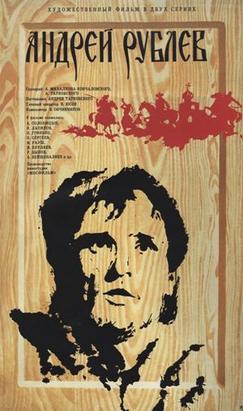
Andrei Rublev is a 1966 Soviet epic biographical historical drama film directed by Andrei Tarkovsky who co-wrote it with Andrei Konchalovsky. The film was re-edited from the 1966 film titled The Passion According to Andrei by Tarkovsky which was censored during the first decade of the Brezhnev era in the Soviet Union. The film is loosely based on the life of Andrei Rublev, a 15th-century Russian icon painter. The film features Anatoly Solonitsyn, Nikolai Grinko, Ivan Lapikov, Nikolai Sergeyev, Nikolai Burlyayev and Tarkovsky's wife Irma Raush. Savva Yamshchikov, a famous Russian restorer and art historian, was a scientific consultant of the film.
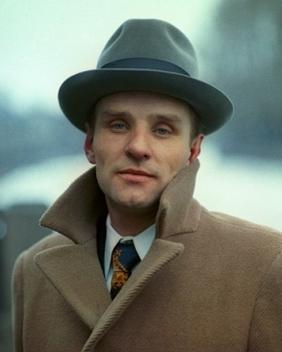
Anatoly (Otto) Alekseyevich Solonitsyn was a Soviet actor known for his roles in Andrei Tarkovsky's films. He won the Silver Bear for Best Actor at the 31st Berlin International Film Festival.
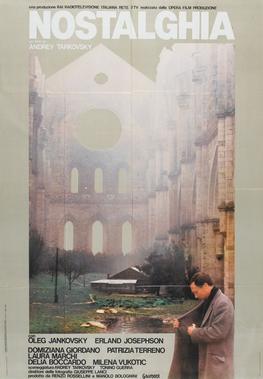
Nostalghia is a 1983 drama film directed by Andrei Tarkovsky and starring Oleg Yankovsky, Domiziana Giordano and Erland Josephson. Tarkovsky co-wrote the screenplay with Tonino Guerra.
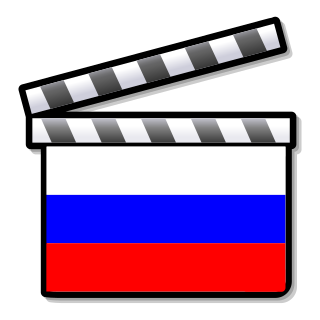
The cinema of Russia, popularly known as Mollywood, refers to the film industry in Russia, engaged in production of motion pictures in Russian language. The popular term Mollywood is a portmanteau of "Moscow" and "Hollywood".

Mirror is a 1975 Soviet experimental drama film directed by Andrei Tarkovsky and written by Tarkovsky and Aleksandr Misharin. The film features Margarita Terekhova, Ignat Daniltsev, Alla Demidova, Anatoly Solonitsyn, Tarkovsky's wife Larisa Tarkovskaya, and his mother Maria Vishnyakova. Innokenty Smoktunovsky contributes voiceover dialogue and Eduard Artemyev composed incidental music and sound effects.

The Steamroller and the Violin, is a 1961 featurette directed by Andrei Tarkovsky and from a screenplay written by Andrei Konchalovsky and Andrei Tarkovsky. The film tells the story of the unlikely friendship of Sasha, a little boy, and Sergey, the operator of a steamroller. The film was Tarkovsky's diploma film at the State Institute of Cinematography (VGIK), but was made at the Mosfilm studio.

Andrei Lvovich Nekrasov is a Russian film and TV director from Saint Petersburg.
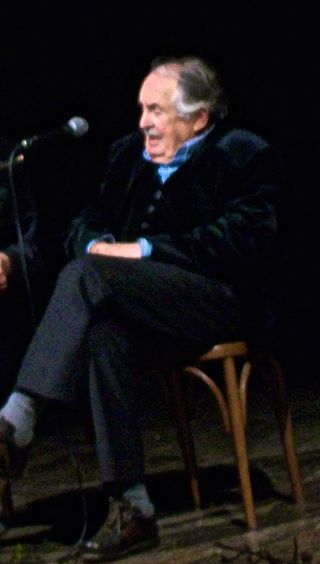
Antonio "Tonino" Guerra was an Italian poet, writer and screenwriter who collaborated with some of the most prominent film directors in the world such as Andrei Tarkovsky, Michelangelo Antonioni, Theo Angelopoulos, and Federico Fellini.
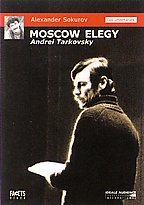
Moscow Elegy is a 1988 documentary film directed by Alexander Sokurov, about the later life and death of Soviet Russian filmmaker Andrei Tarkovsky. The film was originally intended to mark the 50th birthday of Tarkovsky in 1982, which would have been before his death. Controversy with Soviet authorities about the film's style and content led to significant delays in the production.

Andrei Tarkovsky (1932–1986) was a Soviet filmmaker who is widely regarded as one of the greatest directors of all time. His films are considered Romanticist and are often described as "slow cinema", with the average shot-length in his final three films being over a minute. In his thirty-year career, Tarkovsky directed several student films and seven feature films, co-directed a documentary, and wrote numerous screenplays. He also directed a stage play and wrote a book.
One Day in the Life of Andrei Arsenevich is a 2000 French documentary film directed by Chris Marker, about and an homage to the Russian filmmaker Andrei Tarkovsky. The film was an episode of the French documentary film series Cinéastes de notre temps, which in over ninety episodes since 1966 concentrates on individual film directors, film people and film movements. The title of the film is a play on the title of Aleksandr Solzhenitsyn's novella One Day in the Life of Ivan Denisovich.
The Prize of the Ecumenical Jury is an independent film award for feature-length films shown at major international film festivals since 1973. The award was created by Christian film makers, film critics and other film professionals. The objective of the award is to "honour works of artistic quality which witnesses to the power of film to reveal the mysterious depths of human beings through what concerns them, their hurts and failings as well as their hopes." The ecumenical jury can be composed out of 8, 6, 5, 4 or 3 members, who are nominated by SIGNIS for the Catholics and Interfilm for the Protestants. SIGNIS and Interfilm appoint ecumenical juries at various international film festivals, including Cannes Film Festival, Berlin International Film Festival, Locarno International Film Festival, Montreal World Film Festival and the Karlovy Vary International Film Festival.

Solaris is a 1972 Soviet psychological science fiction film based on Stanisław Lem's 1961 novel of the same title. The film was co-written and directed by Andrei Tarkovsky, and stars Donatas Banionis and Natalya Bondarchuk. The electronic music score was performed by Eduard Artemyev and features a composition by J.S. Bach as its main theme. The plot centers on a space station orbiting the fictional planet Solaris, where a scientific mission has stalled because the skeleton crew of three scientists have fallen into emotional crises. Psychologist Kris Kelvin (Banionis) travels to the station to evaluate the situation, only to encounter the same mysterious phenomena as the others.

The 36th Cannes Film Festival was held from 7 to 19 May 1983. The Palme d'Or went to the Narayama Bushiko by Shōhei Imamura.
Aliocha is a French film director.
